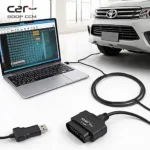Eco OBD2 devices promise to optimize your benzine engine’s performance and deliver significant fuel savings. But do these little gadgets truly live up to the hype? This article dives deep into the world of eco OBD2 fuel savers, exploring their functionality, potential benefits, drawbacks, and ultimately, whether they’re worth the investment.
Understanding Eco OBD2 Fuel Savers
Eco OBD2 devices are marketed as plug-and-play performance chips that connect to your car’s OBD2 port. They claim to analyze your driving habits and adjust the vehicle’s ECU (Electronic Control Unit) to achieve better fuel economy. The concept revolves around optimizing parameters like fuel injection timing and air-fuel ratio based on real-time data. These devices target benzine engines specifically and often promise savings of up to 15-25%. But are these claims realistic? Let’s explore the technology behind these devices and examine the evidence.
How Eco OBD2 Devices Claim to Work
The premise of eco OBD2 fuel savers is that they learn your driving style over time (usually advertised as around 200 km of driving). They then supposedly modify the engine’s parameters to achieve better fuel efficiency based on this learned data. This process involves communicating with the vehicle’s ECU through the OBD2 port. The manufacturers claim that the device optimizes the engine’s performance within the manufacturer’s specified parameters, ensuring no damage to the engine. However, the exact mechanisms by which they achieve these improvements often remain vague.
The Reality of Eco OBD2 Fuel Savings: Separating Fact from Fiction
While the idea of a simple plug-and-play device optimizing fuel economy is attractive, the reality is often more nuanced. Many independent tests and studies have failed to replicate the significant fuel savings advertised by manufacturers. Some studies have even shown negligible or no improvement in fuel economy. The skepticism arises from the complexity of modern engine management systems. These systems are already highly optimized by manufacturers, making it unlikely that a simple add-on device can dramatically improve efficiency.
Potential Benefits and Drawbacks of Using Eco OBD2
Some users have reported marginal improvements in fuel efficiency, while others haven’t noticed any difference. Potential benefits, if any, are likely to be small and vary depending on the vehicle and driving habits.
-
Potential (and often debated) benefits: Slight improvement in fuel economy, potential for smoother engine operation (though this is also often subjective).
-
Drawbacks: Potential compatibility issues with certain vehicles, lack of substantial scientific evidence supporting significant fuel savings claims, risk of voiding vehicle warranty if the device malfunctions and causes damage.
Expert Opinion on Eco OBD2 Benzine Economy Fuel Savers
“The claims made by eco OBD2 manufacturers often sound too good to be true, and in most cases, they are,” says David Miller, Automotive Engineer at Performance Auto Solutions. “Modern engine management systems are incredibly sophisticated, and it’s highly improbable that a simple plug-in device can significantly outsmart the years of engineering and development that have gone into them.”
Eco OBD2: Is it Worth the Investment?
Given the lack of conclusive evidence supporting significant fuel savings, investing in an eco OBD2 device for benzine economy fuel saving is generally not recommended. While the cost of these devices is relatively low, the potential return on investment is questionable.
Conclusion
While the promise of improved benzine economy with an eco OBD2 fuel saver is enticing, the reality often falls short of expectations. Focusing on proven methods like regular vehicle maintenance, adopting fuel-efficient driving habits, and ensuring proper tire inflation are far more effective strategies for improving fuel economy and saving money in the long run.
FAQ
-
Does eco OBD2 work on all benzine cars? – Compatibility varies, and it’s crucial to check manufacturer specifications.
-
Can eco OBD2 damage my engine? – While generally considered safe, malfunctioning devices could potentially cause problems.
-
How much fuel can I save with eco OBD2? – Independent tests show minimal to no significant fuel savings.
-
Is eco OBD2 a scam? – While not necessarily a scam, the advertised benefits are often exaggerated.
-
Are there better alternatives to eco OBD2 for fuel saving? – Yes, proper vehicle maintenance and driving habits are more effective.
-
How does eco OBD2 communicate with the car’s ECU? – Through the OBD2 port, but the exact mechanisms are often unclear.
-
Does eco OBD2 void my car’s warranty? – Potentially, if the device causes damage to the vehicle’s systems.
Need more help? Contact us via WhatsApp: +1(641)206-8880, Email: [email protected] or visit us at 789 Elm Street, San Francisco, CA 94102, USA. Our 24/7 customer support team is ready to assist you.
